Award criteria
The NZWSM was approved in 1946, and was awarded to members of the New Zealand armed forces, the National Military Reserve and the Home Guard, as well as the New Zealand Merchant Navy and Naval Auxiliary Patrol Service. [1] It was awarded in addition to, [2] and worn immediately after, [1] the standard Commonwealth campaign awards for World War II.
The NZWSM was awarded for 28 days' full-time aggregated service or six months' part-time aggregated service between 3 September 1939 and 2 September 1945. Service brought to an end by death on duty, or due to wounds sustained on duty, or honourable discharge as a result of such wounds, automatically qualified for award of the medal. [3]
Some 238,000 medals were issued. [3]

The Pacific Star is a military campaign medal instituted by the United Kingdom in May 1945 for award to British and Commonwealth forces who served in the Pacific Campaign from 1941 to 1945, during the Second World War.
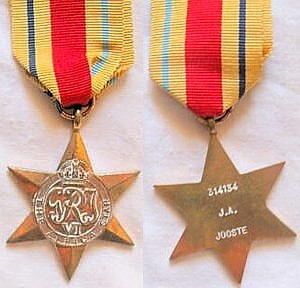
The Africa Star is a military campaign medal, instituted by the United Kingdom on 8 July 1943 for award to British and Commonwealth forces who served in North Africa between 10 June 1940 and 12 May 1943 during the Second World War.

The Africa Service Medal is a South African campaign medal for service during the Second World War, awarded to members of the Union Defence Forces, the South African Police and the South African Railways Police. The medal was originally intended for service in Africa, but it was later extended to cover service anywhere in the world.
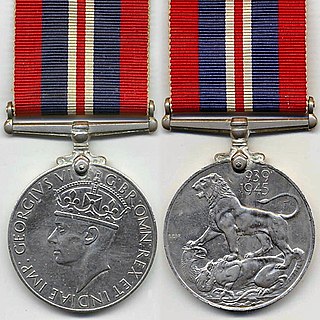
The War Medal 1939–1945 is a campaign medal which was instituted by the United Kingdom on 16 August 1945, for award to citizens of the British Commonwealth who had served full-time in the Armed Forces or the Merchant Navy for at least 28 days between 3 September 1939 and 2 September 1945.
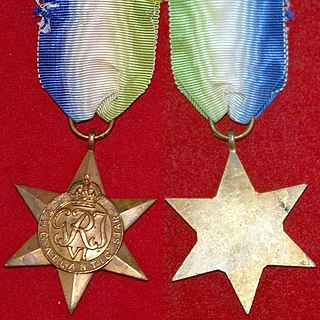
The Atlantic Star is a military campaign medal, instituted by the United Kingdom in May 1945 for award to British Commonwealth forces who took part in the Battle of the Atlantic, the longest continuous campaign of the Second World War.

The 1939–1945 Star is a military campaign medal instituted by the United Kingdom on 8 July 1943 for award to British and Commonwealth forces for service in the Second World War. Two clasps were instituted to be worn on the medal ribbon, Battle of Britain and Bomber Command.

The Air Crew Europe Star is a military campaign medal, instituted by the United Kingdom in May 1945 for award to British and Commonwealth air crews who participated in operational flights over Europe from bases in the United Kingdom during the Second World War.

The Burma Star is a military campaign medal, instituted by the United Kingdom in May 1945 for award to British and Commonwealth forces who served in the Burma Campaign from 1941 to 1945, during the Second World War.
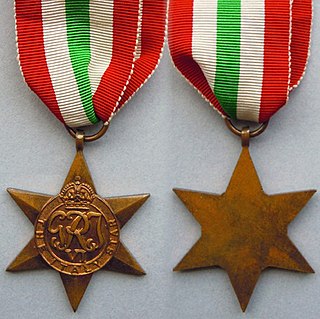
The Italy Star is a military campaign medal, instituted by the United Kingdom in May 1945 for award to British Commonwealth forces who served in the Italian Campaign from 1943 to 1945, during the Second World War.

The France and Germany Star is a military campaign medal, instituted by the United Kingdom in May 1945 for award to British Commonwealth forces who served in France, Belgium, Luxembourg, the Netherlands or Germany and adjacent sea areas between 6 June 1944 and 8 May 1945, during the Second World War.

The Defence Medal is a campaign medal instituted by the United Kingdom in May 1945, to be awarded to citizens of the British Commonwealth for both non-operational military and certain types of civilian war service during the Second World War.
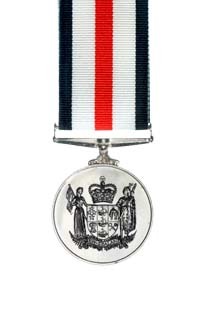
The New Zealand Service Medal 1946–1949 is a New Zealand campaign medal for service in Occupied Japan at the end of World War II.
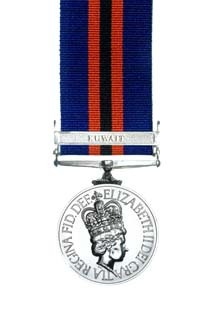
The New Zealand General Service Medal 1992 (Warlike) (NZGSM 1992) is a New Zealand campaign medal, authorised in 1992, for award to New Zealanders who have served in warlike operations for which no separate New Zealand or British Commonwealth campaign medal was issued.
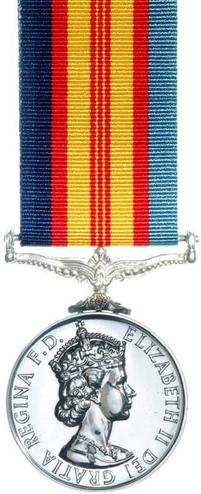
The Vietnam Medal was a joint Australian and New Zealand campaign medal awarded for service in the Vietnam War.

The General Service Medal, is a campaign medal of the United Kingdom introduced in 1962 to replace both the General Service Medal (1918), as awarded to the Army and RAF, and the Naval General Service Medal (1915). The 1962 GSM was awarded until 2007, when it was replaced by the Operational Service Medal. In 2015 the General Service Medal (2008) was introduced.

The Korea Medal, sometimes referred to as the Queen's Korea Medal to distinguish it from the United Nations Service Medal, is a campaign medal created in 1951 to recognize troops from Australia, Canada, New Zealand, and the United Kingdom who had given either one day's service in an air sortie over Korea, or 28 days service offshore, during the Korean War. The medal was identical in all countries where it was awarded, except for Canada where it contained unique elements. An award distributed across the Commonwealth, the Korea Medal holds a different place in each country's order of precedence for honours.

The Australia Service Medal 1939–1945 recognises service in Australia's armed forces, Mercantile Marine and Volunteer Defence Corps during World War II.
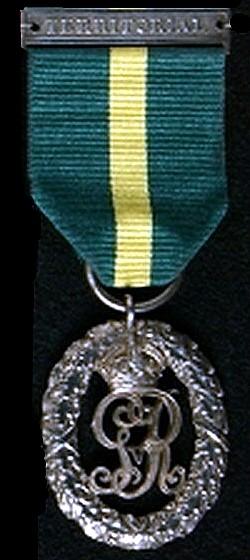
The Efficiency Decoration, post-nominal letters TD for recipients serving in the Territorial Army of the United Kingdom or ED for those serving in the Auxiliary Military Forces, was instituted in 1930 for award to part-time officers after twenty years of service as an efficient and thoroughly capable officer. The decoration superseded the Volunteer Officers' Decoration, the Colonial Auxiliary Forces Officers' Decoration and the Territorial Decoration.

The New Zealand Defence Service Medal (NZDSM) is a military service medal awarded to former and current members of the New Zealand Defence Force, for qualifying service since 3 September 1945. It is expected that at least 160,000 former service personnel and more than 7,000 currently serving NZDF personnel are eligible to receive the medal.
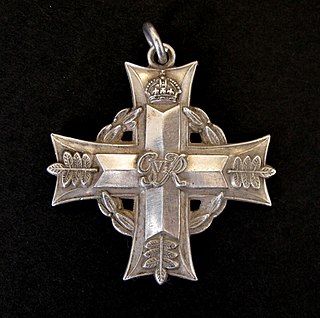
The New Zealand Memorial Cross is awarded to the next of kin of New Zealand service personnel who, since September 1939, have been killed on active service or later died of their wounds.





















